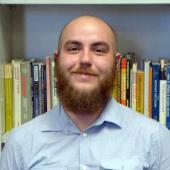Poesía del Sol | Poetry of the Sun
The Department of English has joined Mayo Clinic, ASU’s Institute for Humanities Research (IHR), the College of Nursing and Health Innovation (CONHI), and the Lincoln Center for Applied Ethics in an exciting collaboration with medical humanities at the core.
During spring 2013, the IHR launched its medical humanities initiative, an emerging field “committed to bringing the insights of humanities disciplines to healthcare research, training and policy-making” (IHR website). The initial symposium gathered researchers and scholars in bioethics, literary studies, narrative analysis and theory, narrative medicine, discourses and experiences of health and illness, the history of medicine, disability studies, philosophy and religious studies, and global health and development, a group that included English faculty Cora Fox (IHR Associate Director) and Mark Lussier (Chair of English). Last summer, English and IHR established an internship, which allowed undergraduate English major and Barrett honors student Courtney Block to conduct research and gather program information in preparation for subsequent curricular development and for her honors thesis. The first critical fruits of the collaboration, “The Necessity of Narrative: Linking Literature and Health Care in Higher Education Curricula,” was delivered by Alison Essary (Director of Student Affairs, College of Health Solutions) and Lussier at the Health, Nursing, Aging and Nutrition conference at Oxford University in August, with an expanded version appearing in print later this year in the Forum on Public Policy. Following the conference Essary and Lussier sought to move the research into a curriculum based on shared goals and to broaden the partnership with the Mayo Clinic as the relationship between university and clinic grows.
"I opened up the door and there’s a woman who is suffering from bone cancer and she’s twenty-two. That put a lot of things into perspective for me: how grateful I should be for what I have. It was a heart-wrenching experience but I think a necessary one. I think every time you walk away from time at the clinic, you feel lighter because you realize how easy you have it."
– Kyle Bassett, MFA student Poesía del Sol Participant.
The English department has a previously established and highly respected connection to Mayo through the Poesía del Sol program (inaugurated Fall 2005 and recently reinvigorated), which is run by the Creative Writing Program with ASU Project Humanities and led by Regents Professor and Arizona poet laureate Alberto Ríos. In the program, MFA students meet palliative care patients at Mayo and create poems based on “the untold but well-remembered” details in patients’ lives, and at the end of each session, the MFA students present their patients, and sometimes the patients’ families, with framed poems reflecting the patients’ words and memories. The program’s goal isn’t narrative medicine but “lyric medicine.” Ríos explained, “What has been remembered paired with what needs to be remembered are often the basis of art and science both, but at their most successful include aspects of life so often critically overlooked—the glints and edges of feeling, imagination, experience, and all the rest—the iron and silk extremes that are also part of our lives. This is the power of the single detail rather than the quotidian experience. In this particular project, these threads come together in a profound context of last, and lasting, things.”
The Poesía del Sol experience, while created for the patients, has lasting effects on student participants as well. MFA student Kyle Bassett, who participated in the program last year, described one of his sessions: “I opened up the door and there’s a woman who is suffering from bone cancer and she’s twenty-two. That put a lot of things into perspective for me: how grateful I should be for what I have. It was a heart-wrenching experience but I think a necessary one. I think every time you walk away from time at the clinic, you feel lighter because you realize how easy you have it.”
The logical supplement to this poetic effort would be the cultivation of narrative abilities and the creation of narrative forms, the art and practice seen at the foundation of current medical humanities initiatives and programs, and Fox and Lussier proposed such expansion and other collaborative projects in a recent meeting in Tempe with Mayo representatives Katherine (Kit) Kough, Renee Caswell, Lisa Marks, and Nicole Pettenati. The collaborative research and community outreach has also led to an immediate curriculum development, with a newly designed course (ENG 204: Introduction to Contemporary Literature: Narrative and Medicine) being taught by Jason Robert (Lincoln Professor and Director, Lincoln Center for Ethics) in fall 2015. This pilot will lead into a transdisciplinary certificate in medical humanities housed in the Department of English.
—Corey Campbell

